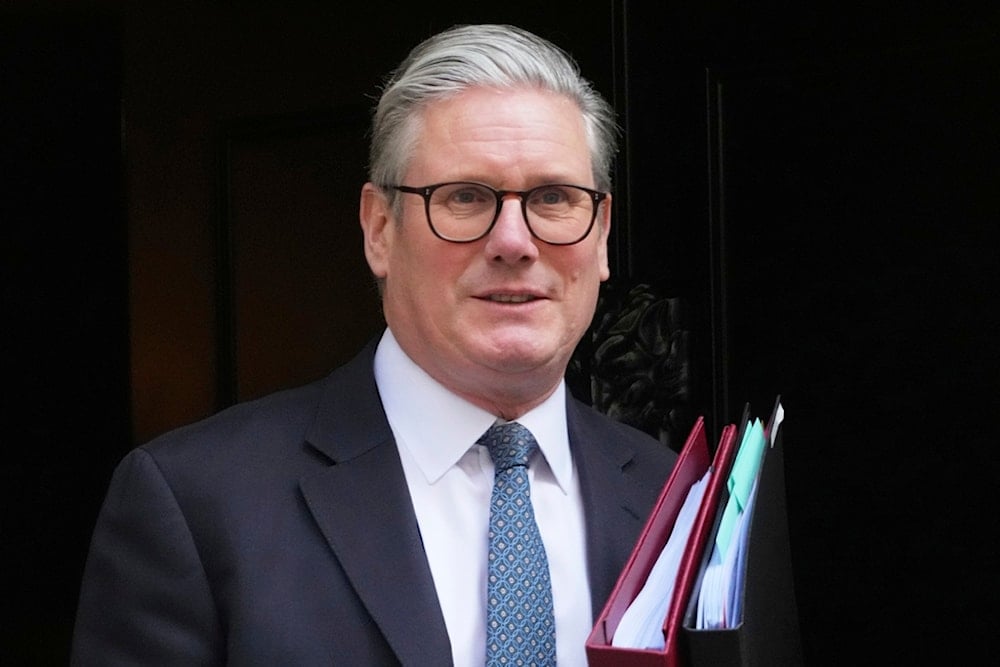Starmer pledges to shield UK firms from impact of Trump’s tariff surge
This week, the UK was hit with a 10% baseline import duty, alongside a 25% tariff on car exports, as well as steel and aluminium products.
-
 Britain's Prime Minister Keir Starmer leaves 10 Downing Street to attend the weekly session of Prime Minister's Questions in parliament, London, Wednesday, April 2, 2025 (AP)
Britain's Prime Minister Keir Starmer leaves 10 Downing Street to attend the weekly session of Prime Minister's Questions in parliament, London, Wednesday, April 2, 2025 (AP)
UK Prime Minister Sir Keir Starmer has said he is prepared to deploy industrial policy tools to protect British businesses from the economic fallout of US President Donald Trump's sweeping new tariffs.
In an article for The Sunday Telegraph, Starmer reiterated his commitment to pursuing a trade agreement with the United States to mitigate the impact of the tariffs but suggested that direct state intervention may be necessary to safeguard the national interest.
"Some people may feel uncomfortable about this – the idea the state should intervene directly to shape the market has often been derided," he wrote. "But we simply cannot cling on to old sentiments when the world is turning this fast."
This week, the UK was hit with a 10% baseline import duty alongside a 25% tariff on car exports, as well as steel and aluminium products. Some countries will face tariffs as high as 50%, beginning April 9.
Trump has justified the move as a strategy to encourage Americans to buy domestically and stimulate the US economy. However, the tariffs—along with retaliatory measures from countries such as China—have triggered sharp declines in global markets, with stocks falling by more than 5% amid fears of a global recession.
In response, Jaguar Land Rover announced on Saturday that it would temporarily suspend shipments to the US while it adapts to the new trade conditions.
Starmer pledged to "turbocharge plans that will improve our domestic competitiveness, so we're less exposed to these kinds of global shocks."
He did not rule out tax increases in the autumn but noted that the government had refrained from doing so in the Spring Statement.
Labour’s promised industrial strategy, outlined in the party's election manifesto, is expected to be unveiled this summer, the BBC reported, adding that elements of the plan could be expedited to support UK firms during the current crisis.
In the Telegraph, Starmer stressed the government's commitment to a "calm" response to the US while maintaining that “all options remain on the table.”
"I will only strike a deal if it is right for British business and the security of working people," he emphasized.
Conservative leader Kemi Badenoch urged the prime minister to secure a “deep and meaningful trade deal” with the US, one that drives economic growth without sacrificing standards.
The UK exported nearly £60 billion in goods to the US last year, primarily in machinery, automobiles, and pharmaceuticals, according to the BBC.
On Wednesday, the government released a 400-page list of US goods that could be subject to retaliatory tariffs. Business Secretary Jonathan Reynolds told Parliament that consultations with affected industries would help shape the response.
The list covers 27% of US imports, chosen to minimize the economic impact on the UK, according to the Department for Business and Trade.
Starmer also said he would seek to lower trade barriers with other economies to cushion the blow of the US tariffs on British exports.
Over the weekend, the prime minister held talks with several world leaders to coordinate a global response. In a phone call with French President Emmanuel Macron on Saturday, both agreed that a trade war would serve no one’s interests but affirmed that “nothing should be off the table.”
Nonetheless, both the Conservative Party and the Liberal Democrats have warned that UK families and businesses will immediately feel the impact of a National Insurance hike for employers, which came into effect Sunday.
Read more: Musk expresses hope for US-EU free trade following tariff frenzy

 4 Min Read
4 Min Read










